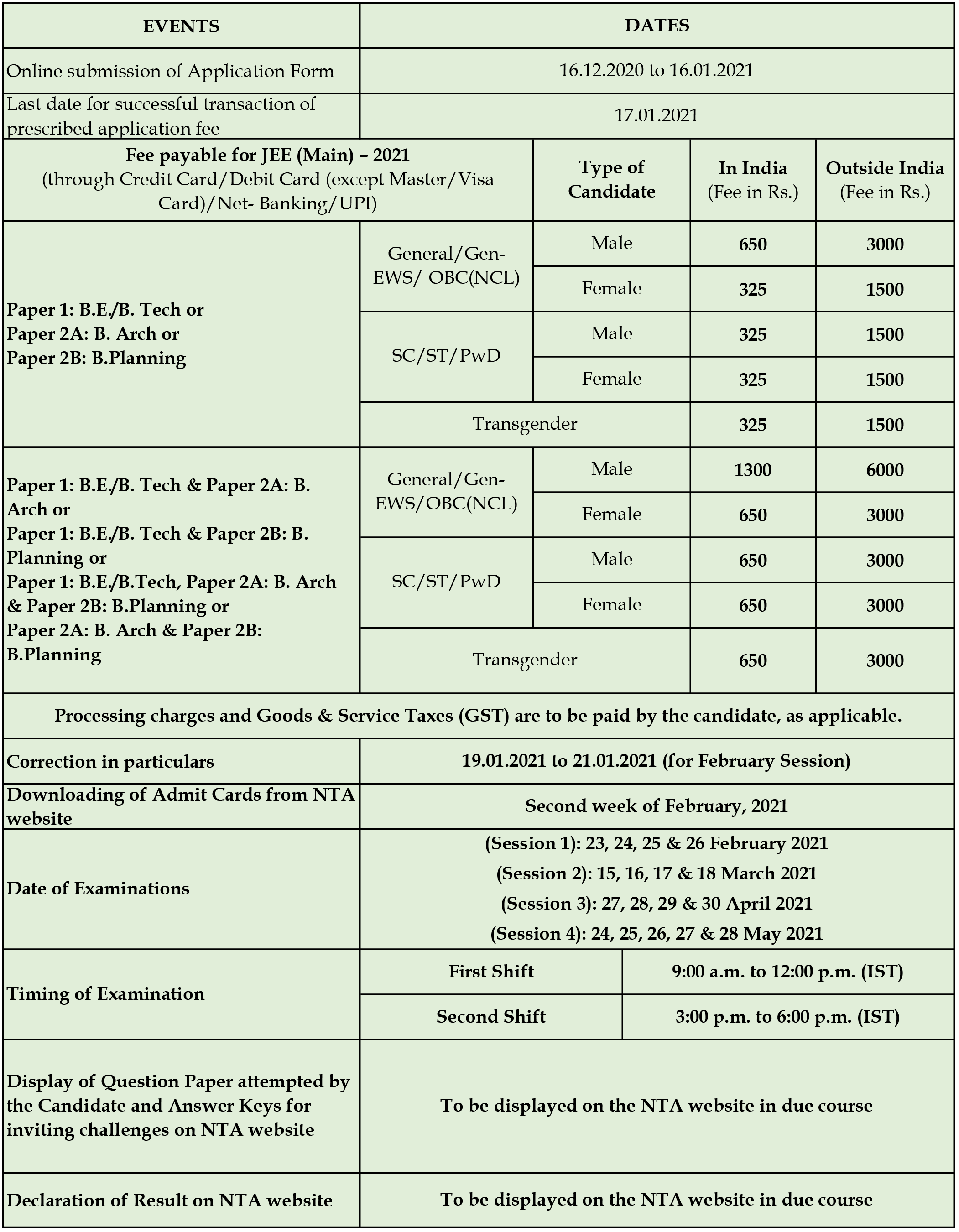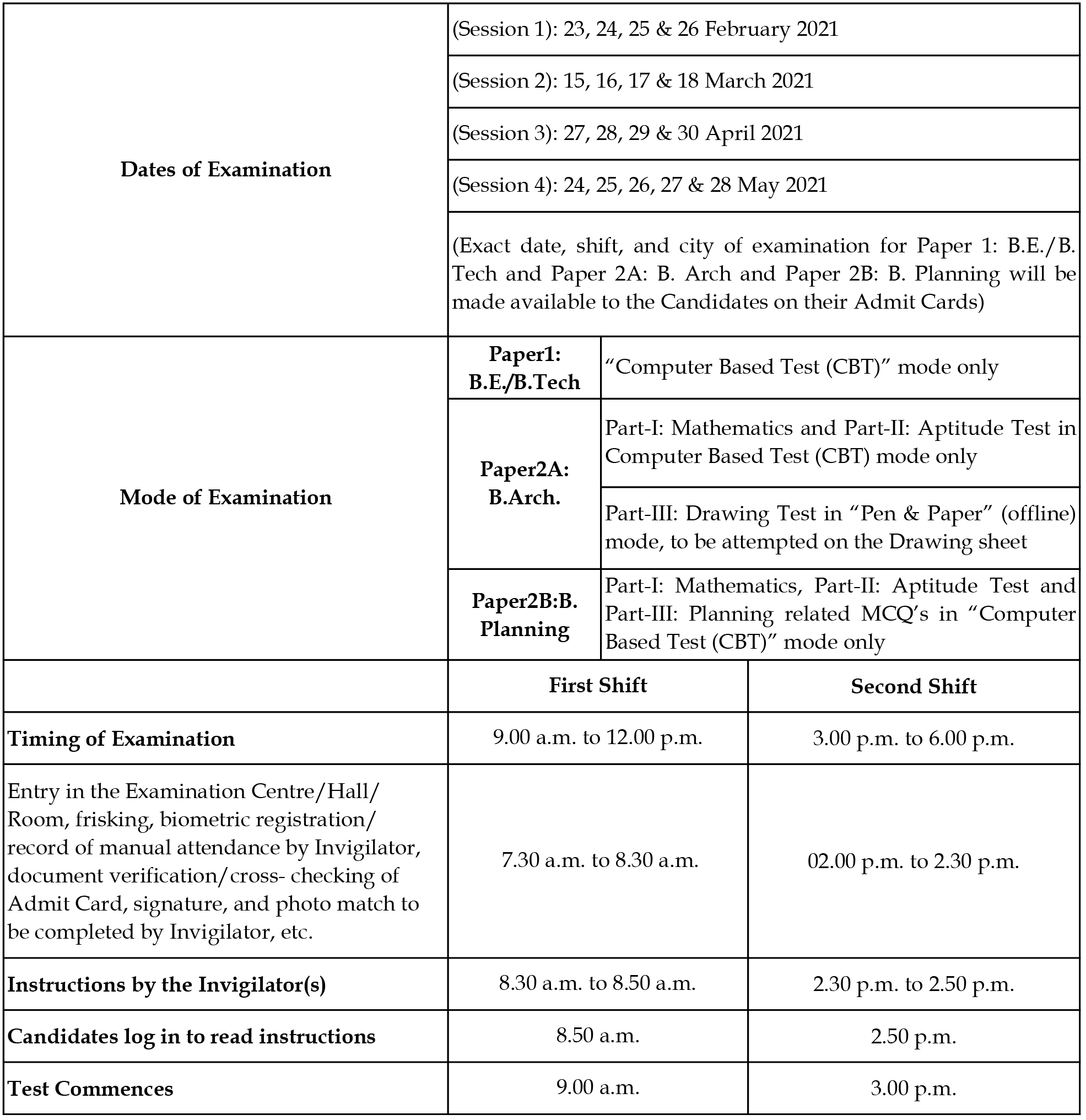What is JEE MAIN?
IIT- JEE Main – is the most reputed Engineering entrance exam in India. It is the gateway for IITs, NITs and various other prestigious Engineering colleges.
- Introduction about JEE
- Important Information at Glance
- Schedule of Examination
- Mode of Examination / Syllabus
- JEE Eligibility Criteria(JEE Main)
- JEE Eligibility Criteria(JEE Advanced)
- Choice of Medium of Question Paper:
- State Code of Eligibility
- Eligibility for Admission to NITs, IIITs and CFTIs participating though Central Seat Allocation Board (CSAB)
- Eligibility for Admission to Other Institutions
- Seat Allocation Process and Admission Procedure
Introduction about JEE
The Department of Higher Education, Ministry of Human Resource Development (now known as Ministry of Education), Government of India has entrusted the responsibility of conducting Joint Entrance Examination JEE (Main) to the NTA from 2019 onwards.
The Joint Entrance Examination (JEE Main) comprises of two papers. The Paper1 is conducted for admission to Undergraduate Engineering Programs (B.E/B. Tech) at NITs, IIITs, other Centrally Funded Technical Institutions (CFTIs), Institutions/Universities funded/recognized by participating State Governments, as well as an eligibility test for JEE (Advanced), which is conducted for admission to IITs.
* The JEE (Main) is being conducted in multiple Sessions (February/March/April/May 2023) for admissions in the next academic session. The candidates will thus benefit in the following ways:
* This will give multiple opportunities to the candidates to improve their scores in the examination if they fail to give their best in the first attempt without wasting their whole academic year.
* In first attempt, the students will get a first-hand experience of taking an examination and will know their mistakes which they can improve while attempting for the next time.
* This will reduce the chances of dropping a year and droppers would not have to waste a full year.
* If anyone missed the examination due to reasons beyond control, then he/she will not have to wait for one full year.
* A candidate need not appear in all the four Sessions. However, if candidate appears in more than one Session then his/her best of the 2023 NTA Scores will be considered for preparation of Merit List/ Ranking.
* The student’s best of the 2023 NTA Scores will be considered for preparation of Merit List/ Ranking.
Important Information at Glance

Schedule of Examination

JEE (Main)-2023 will be conducted in the following modes:
Paper 1 (B.E. /B. Tech.) in “Computer Based Test (CBT)” mode only.
Paper 2A (B. Arch): Mathematics (Part-I) and Aptitude Test (Part-II) in “Computer Based Test (CBT)” mode only and Drawing Test (Part-III) in pen & paper (offline) mode, to be attempted on drawing sheet of A4 size.
Paper 2B (B. Planning): Mathematics (Part-I), Aptitude Test (Part-II) and Planning Based Questions (Part-III) in Computer Based Test (CBT) mode only.
SYLLABUS:
Paper 1(B.E./B.Tech)
- Mathematics, Physics and Chemistry (Section A-Physical Chemistry, Section B- Inorganic Chemistry and Section C- Organic Chemistry)
Paper -2A (B.Arch)
* Mathematics, Aptitude and Drawing
Paper -2B (B.Planning)
* Mathematics, Aptitude and Planning
For detailed syllabus visit:- https://jeemain.nta.nic.in/webinfo2023/File/GetFile?FileId=9&LangId=P
JEE Eligibility Criteria:
Age Limit
For appearing in the JEE (Main) 2023, there is no age limit for the candidates. The candidates who have passed the class 12 / equivalent examination in 2019, 2020, or appearing in 2023 irrespective of their age can appear in JEE (Main) 2023 examination. However, the candidates may be required to fulfil the age criteria of the Institute(s) in which they are desirous of taking admission.
List of Qualifying Examinations (QE)
- The final examination of the 10+2 system, conducted by any recognized Central/State Board.
- Intermediate or two-year Pre-University examination conducted by a recognized Board/ University.
- Final examination of the two-year course of the Joint Services Wing of the National Défense Academy
- Senior Secondary School Examination conducted by the National Institute of Open Schooling with a minimum of five subjects
- Any Public School/ Board/ University examination in India or any foreign country recognized as equivalent to the 10+2 system by the Association of Indian Universities (AIU).
- Higher Secondary Certificate Vocational Examination
- A Diploma recognized by AICTE or a State board of technical education of at least 3 years duration
- General Certificate Education (GCE) examination (London/Cambridge/Sri Lanka) at the Advanced (A) level
- High School Certificate Examination of the Cambridge University or International Baccalaureate Diploma of the International Baccalaureate Office, Geneva.
Year of Appearance in Qualifying Examination
Only those candidates who have passed Class 12 / equivalent examination in 2019, 2020 or 2023; or those who are appearing in Class 12 / equivalent examination in 2023, are eligible to appear in JEE (Main) 2023.
Candidates who passed Class 12/equivalent examination in 2018 or before as well as those who will appear in such examination in 2022 or later are not eligible to appear in JEE (Main) 2023.
Candidates must note that the IITs permit only two attempts for the JEE (Advanced), i.e. a candidate should have appeared for the Class XII (or equivalent) examination for the first time in either 2020 or 2023, subject to the condition of not having been admitted at an IIT on an earlier occasion. Details may be obtained from the Information Brochure of the JEE (Advanced) 2023. Please see link: https://home.iitd.ac.in/news-jab.php https://jeeadv.ac.in/.
JEE Advanced:
The minimum academic qualification for appearing in JEE (Advanced) -2023 is that the candidate must have passed in final examination of Class 12 or equivalent qualifying examination with at least 75% aggregate marks (65% for SC, ST, and PwD) or being in the top 20 percentile of the successful candidates in their respective Board examinations.
Those appearing in these examinations in 2023 can also appear in JEE (Advanced) - 2023 provisionally and these candidates would also have to fulfill the above requirements. The IITs have specific eligibility criteria for admission, which include an age bar, limited number of attempts, and year of passing class 12th or equivalent; candidates are advised to refer to the JEE (Advanced) 2023 website for details. http://jeeadv.ac.in/
All the candidates aspiring to take admission to the undergraduate programs at IITs for the year 2023 will have to appear in the B. E. /B. Tech. of JEE (Main)-2023. Based on the performance in the B. E. /B. Tech. of JEE (Main)-2023, number of top candidates as per the requirement of JEE (Advanced) (including all categories) will be eligible to appear in JEE (Advanced)-2023.
A candidate can attempt JEE (Advanced) a maximum of two times in consecutive years irrespective of whether or not he/she passed the Qualifying Examination. The candidates, who have attempted JEE (Main) /JEE (Advanced) in 2020 or earlier, are NOT ELIGIBLE to appear in JEE (Advanced)–2023.
The candidate who had taken admission in any institute other than IITs in 2020 is eligible to appear in JEE (Advanced)–2023 provided that the candidate satisfies other eligibility criteria.
JEE (Advanced) 2023 for admission to various programs at IITs will be held as per the following schedule:
Choice of Medium of Question Paper:
| S. No. | Language | Examination Centres |
|---|---|---|
1. | English | All Examination Centres |
2. | Hindi | All Examination Centres in India |
3. | English and Assamese | Examination Centres in Assam |
4. | English and Bengali | Examination Centres in West Bengal, Tripura and Andaman & Nicobar Island |
5. | English and Gujarati | Examination Centres in Gujarat, Daman and Diu, Dadra and Nagar Haveli |
6. | English and Kannada | Examination Centres in Karnataka |
7. | English and Marathi | Examination Centres in Maharashtra |
8. | English and Malayalam | Examination Centres in Kerala and Lakshadweep |
9. | English and Odia | Examination Centres in Odisha |
10. | English and Punjabi | Examination Centres in Punjab, Chandigarh and Delhi |
11. | English and Tamil | Examination Centres in Tamil Nadu, Puducherry and Andaman & Nicobar Island |
12. | English and Telugu | Examination Centres in Andhra Pradesh and Telangana |
13 | English and Urdu | All Examination Centres in India |
The option of language for question paper should be exercised while filling up the
Application Form online and it cannot be changed at a later stage.
Please note that for the correctness of the questions in all the question papers, the English version will be taken as final.
State Code of Eligibility
State Code of eligibility is the Code of the State from where the candidate has passed Class 12th /Equivalent qualifying examination. Thereby, the candidate is eligible to appear in JEE Main for seeking admission to BE/BTech and BArch/BPlan courses offered by Institutions/Colleges of the State/UT.
State | Code | State | Code | |
Andaman & Nicobar Islands (UT) | 01 | Andhra Pradesh | 02 | |
Arunachal Pradesh | 03 | Assam | 04 | |
Bihar | 05 | Chandigarh (UT) | 06 | |
Chhattisgarh | 07 | Dadra and Nagar Haveli (UT) | 08 | |
Daman and Diu (UT) | 09 | Delhi | 10 | |
Goa | 11 | Gujarat | 12 | |
Haryana | 13 | Himachal Pradesh | 14 | |
Jammu & Kashmir | 15 | Jharkhand | 16 | |
Karnataka | 17 | Kerala | 18 | |
Lakshadweep (UT) | 19 | Madhya Pradesh | 20 | |
Maharashtra | 21 | Manipur | 22 | |
Meghalaya | 23 | Mizoram | 24 | |
Nagaland | 25 | Odisha | 26 | |
Puducherry (UT) | 27 | Punjab | 28 | |
Rajasthan | 29 | Sikkim | 30 | |
Tamil Nadu | 31 | Tripura | 32 | |
Uttar Pradesh | 33 | Uttarakhand | 34 | |
West Bengal | 35 | Telangana | 36 | |
Foreign/OCI/PIO/Nepal/Bhutan (Outside India) | 97 |
|
| |
Eligibility for Admission to NITs, IIITs and CFTIs participating though Central Seat Allocation Board (CSAB):
Admission to B.E. / B.Tech / B.Arch / B.Planning. Courses in NITs, IIITs, and CFTIs participating though Central Seat Allocation Board will be based on All India Rank subject to the condition that the candidate should have secured at least 75% marks in the 12thclass examination or be in the top 20 percentile in the 12th class / Qualifying examination conducted by the respective Boards. For SC/ST candidates the qualifying marks would be 65% in the 12th class / qualifying examination.
The eligibility criteria decided by the Council of Architecture for admission to B.Arch. course other than NITs, IIITs, CFTIs:
“No candidate shall be admitted to Architecture course unless she/he has passed an examination at the end of the qualifying examination with 50% marks in Physics, Chemistry, and Mathematics and also 50% marks in aggregate of the qualifying examination”.
For B. Planning, the candidates should have passed the qualifying examination with 50% marks in Mathematics and 50% marks in aggregate of the qualifying examination.Subject combinations required in the qualifying examination for admission to B.E./B.Tech, B. Arch, and B. Planning Courses in NITs, IIITs, and other CFTIs shall be as under.
Course | Required Criteria based on Class 12th / Equivalent qualifying Examination |
B.E/B.Tech. | Passed qualifying examination with Physics and Mathematics as compulsory subjects along with one of the Chemistry/Biotechnology/Biology/ Technical Vocational subjects. |
B.Arch. | Passed qualifying examination with Mathematics, Physics, Chemistry |
B.Planning | Passed qualifying examination with Mathematics |
Eligibility for Admission to Other Institutions
The above-mentioned policy could also be adopted by other Technical Institutions participating in counseling through JoSAA/CSAB. In case a State opts to admit students in the engineering Colleges affiliated to State Universities, the State may prepare a separate rank list based on criteria decided by them.
For all admission related procedures/queries, the candidates are advised to refer to the website of JoSAA, Central Seat Allocation Board (CSAB), or the concerned State Government/Institute after the declaration of result/ranks of JEE (Main) 2023
Candidates shall be admitted based on their choices and All India Ranks of JEE (Main) 2023 through a Seat Allocation Process to be announced later CSAB/ JoSAA.
The authentication/verification of relevant documents in support of identification, date of birth, qualifying examination, State of eligibility, category and disability (if any) of the qualifying candidates would be done at the time of Seat Allocation/ admission process.
On failing to produce any of the authentic documents, the candidate may not be considered for admission.
Gen-EWS, SC, ST, OBC and PwD candidates will be required to produce original certificate as per prescribed formats issued by the competent authority at the time of Seat Allocation / admission process failing which they will not be considered for admission.
